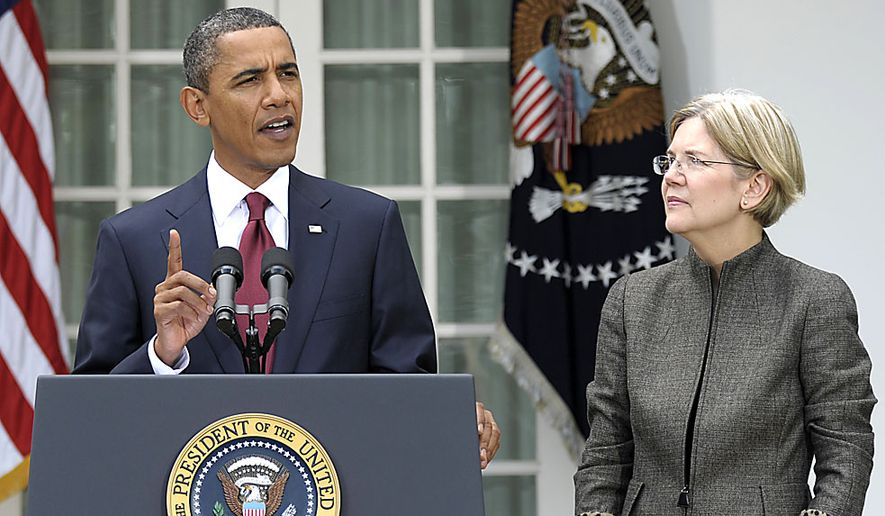The Supreme Court said Friday it will hear a case challenging the constitutionality of the Consumer Financial Protection Bureau, the agency President Barack Obama and Sen. Elizabeth Warren set up to police Wall Street in the wake of the Great Recession.
The case is a major test of Congress’ powers and the expanding regulatory state.
At issue is whether the CFPB, an “independent” agency that vests its powers in a single chief who gets funding outside the usual appropriations process and is shielded from being fired by the president, is too powerful to survive scrutiny.
For Ms. Warren, architect of the CFPB, that independence was the point — she wanted a Wall Street cop who couldn’t be swayed by political pressure.
But critics say the country’s founders feared that kind of concentration of power in the hands of an unelected official, which is why most agencies are answerable directly to the president or, if they’re independent, they have multiple commissioners or directors to spread power around.
Lower courts have offered conflicting rulings on the agency — including the Circuit Court of Appeals in Washington, where then-Judge Brett Kavanaugh led a three-judge panel in ruling the CFPB was unconstitutional, then dissented in a later ruling when the full appeals court overturned his decision and found the panel to pass muster.
“No independent agency exercising substantial executive authority has ever been headed by a single person. Until now,” Justice Kavanaugh wrote.
In a twist, the CFPB signaled it agrees with the critics and urged the Supreme Court to take up the case to rule against the agency.
The Democrat-led House has stepped into the breach, filing a brief defending the agency as proper and urging the justices to reject the case.
The Community Bankers Association said it was happy the justices will settle the CFPB’s standing once and for all, but it said whatever the court does, Congress should change the structure to create a governing commission with multiple members.
“A sole-director calling all the shots will never provide the long-term stability consumers deserve and the well-regulated financial sector needs,” said Richard Hunt, president of the association.
Justice Kavanaugh’s involvement in the lower-court case had some of his opponents demanded he recuse himself on the high court.
“Justice Kavanaugh has demonstrated bias against the CFPB on these exact issues,” said Derek Martin, director of Allied Progress. “Justice Kavanaugh cannot be the deciding vote to allow Donald Trump and his financial industry supporters to neuter the Bureau going forward.”
Justices get to decide their own recusals and there was no indication in Friday’s court order that Justice Kavanaugh had withdrawn from involvement in the case. It is traditional that justices do not sit on cases that they heard while on lower courts, but the actual case that’s reached the high court, while covering the same issues, has different litigants.
The CFPB was a key part of the 2010 Dodd-Frank law passed by a Democratic Congress and signed by Mr. Obama.
The agency has the power to fine financial institutions and has amassed $13 billion in penalties.
But the CFPB has been mired in controversies from the start.
Ms. Warren had been in line to be the first director of the agency, but Senate Republicans made clear they would have blocked her nomination.
They did block Mr. Obama’s next choice, Richard Cordray, forcing Mr. Obama to use his recess appointment powers in early 2012 to force Mr. Cordray onto the CFPB anyway.
That appointment was later challenged as unconstitutional, though the Senate eventually confirmed Mr. Cordray.
He left in 2017 to attempt an ill-fated run for Ohio governor, and his bid to install a hand-picked successor was thwarted by President Trump, who sent then-Budget Director Mick Mulvaney over to the agency to act as chief.
• Stephen Dinan can be reached at sdinan@washingtontimes.com.




Please read our comment policy before commenting.